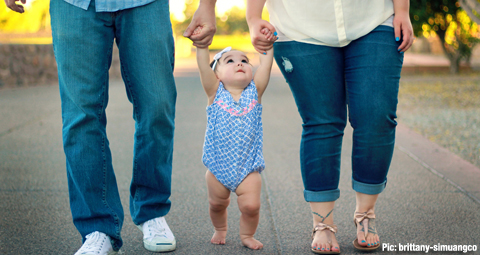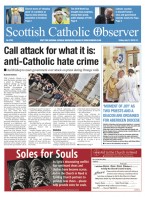BY Peter Diamond | July 13 | ![]() 0 COMMENTS
0 COMMENTS ![]() print
print

Church warns of ‘sleeping giant’ of declining population
The Church has said Scotland needs to wake up to the ‘sleeping giant’ of its declining population after recent statistics revealed there were more than 5,000 deaths than births last year
Annual statistics released from the National Records of Scotland showed that the difference between the numbers of people dying and being born has doubled within the space of one year.
In 2017 there were 5,022 more deaths than births registered—a rise of 2,240 on the difference recorded in 2016.
Last year the number of abortions carried out in Scotland also hit a five-year peak with over 12,000 terminations.
Responding to the figures, Bishop Stephen Robson of Dunkeld Diocese has joined the Church and pro-life groups in highlighting marriage, immigration and tackling abortion as key issues to solving the problem.
“There is crisis within Scottish society on a number of levels, which have contributed to the spike in deaths and low birth rates,” the bishop said. “Within the Church marriages are at a critical level, which ultimately has an impact on the number of births.
“When I was ordained a priest 40 years ago I would say there were between 40 and 50 marriages per year but by the time I was becoming a bishop that had dropped to about eight or nine.
“Sadly in my own diocese of Dunkeld there are some parishes that haven’t had a wedding in their church for a number of years, so it is a difficult issue that can create some anxiety.
“Of course Scotland could have had a higher population if there were no abortions and it is extremely saddening to see the increase of eugenic abortions in recent years of children with disability, particularly babies born with Down’s syndrome. It saddens me that some people don’t realise they bring so much happiness, so much love and affection to their family and friends throughout their lives.
“People don’t see morality argued from a principled point of view anymore but rather from the view of ‘self’ and how they feel about it at that particular point in their life, with choice being the paramount concern.
“There appears to be a crisis of commitment within society too and that has an affect on our children and our schools.
“Sadly some young people are brought up in homes where there are multiple partners over many years or sometimes no partners at all. This is destabilising for children and I think the lack of commitment has proved to be one of the biggest contributors that have fractured an emphasis on family, a key principle of Church teaching.”
Drug problem
The bishop added that a ‘contributing factor to the high death rate’ was Scotland’s ‘horrific problems due to alcohol and drugs, with recent drug deaths figures soaring last year, the highest number recorded in a decade.’
“Our young people face enormous pressures from society, major psychological issues, which sadly result in a large number of suicides,” he continued. “My city of Dundee has recently been given the worse suicide rate in mainland Scotland for the second year in a row. These are big challenges and we play our part in helping combat these issues by supporting those that need it most within our parishes.
“I think we have lost the battle on a number of issues but we must not ever derail from our values and principles just because modern society rejects them.
The World Meeting of Families, he said, will be ‘watched very closely next month’ as it is ‘being held in Western Europe where the decline of marriage and life has been growing for a number of years.’
The bishop also said that immigration was needed to boost the workforce, but added that ‘we must ensure that these people are integrated into our society and culture properly through supportive means.’
“I think Scotland is much more open to immigration than other parts of the UK but we also need larger families and the Church will always be supportive of that,” he said. “I think Scotland’s Government is more socially conscious of the problem than the UK Government with much more integrated services particularly for older people.
“However the likelihood is that in years to come taxes will be raised if they are going to sustain those services, with a growing older population.”
‘Dying’ Europe
A spokesman for the Catholic Church said the new national statistics showed that the problem of a declining population ‘is not confined to Mediterranean countries but exists here too.’
“The Holy Father Francis has repeatedly referred to Europe as ‘dying’ because of its low birth and high death rate,” he said. “Europe—and Scotland as part of Europe—is having fewer children. Some are denied the right to be born, but there has also been a failure to pass on the material and cultural tools that young people need to face the future. Even economically the impacts of low birth rates and longer life expectancy are very worrying.
“The challenge is to support family stability, provide financial help for those who cannot afford to have children—though they would like to—and open our minds and hearts to those immigrants and refugees who are desperate to come here, whose work and culture would enrich our lives and boost our birth rate and thus have a positive impact socially and economically.
“Given the current split of powers such an opening can only be granted by the UK Government which strictly controls immigration.”
Abortion
Pro-life group The Society for the Protection of Unborn Children (SPUC Scotland) said that Scotland is ‘now seeing the effects of 50 years of the abortion act being legalised.’
A spokeswoman for SPUC Scotland said: “These trends illustrate to us the growing culture of death and the influence abortion has on the demographics of Scotland.
There were 5,022 more deaths than births in 2017. What these numbers don’t tell you is that there were 12,212 abortions in Scotland in 2017. That is 12,212 lives lost from our communities. What a tragedy it is that we are destroying our own communities in this way.
“We live in a society that privileges personal freedom and choice over family and community. This year marked 50 years of legal abortion in the UK, and we are now seeing the long-term effects this has had. It is no longer the norm to uphold and value family life. These statistics illustrate this very clearly.
“Society has indeed lost its value for life, and no longer welcomes and celebrates new life as it once did. Personal choice is upheld above all else; but of course, our actions have ramifications for our communities. The harm of abortion is reverberating through the whole of our society—which is evidenced by the most recent data.”
She added: “The first priority must be to stop promoting anti-life policies. Pregnancy has been portrayed as something to be avoided at all cost, akin to a disease. An unplanned pregnancy is seen as a disaster with no solution other than abortion. Family is seen as burdensome.
“We must promote family life as good and support people in difficult situations, showing them that they are more than capable. Only then will we see a change in the culture.”











